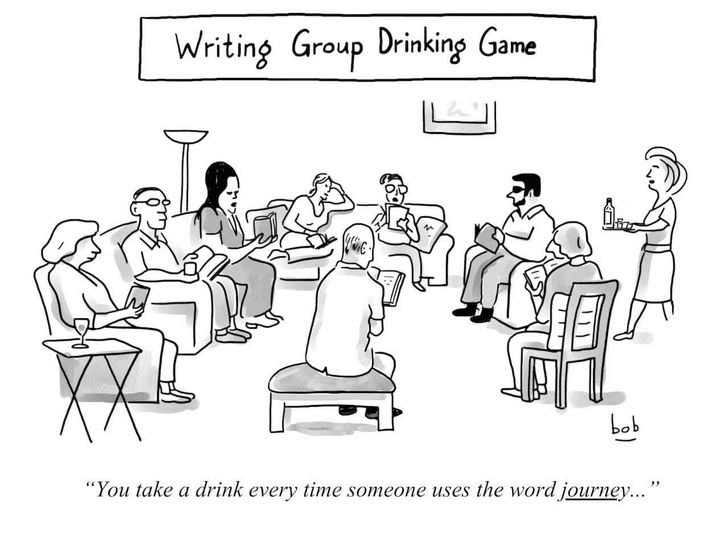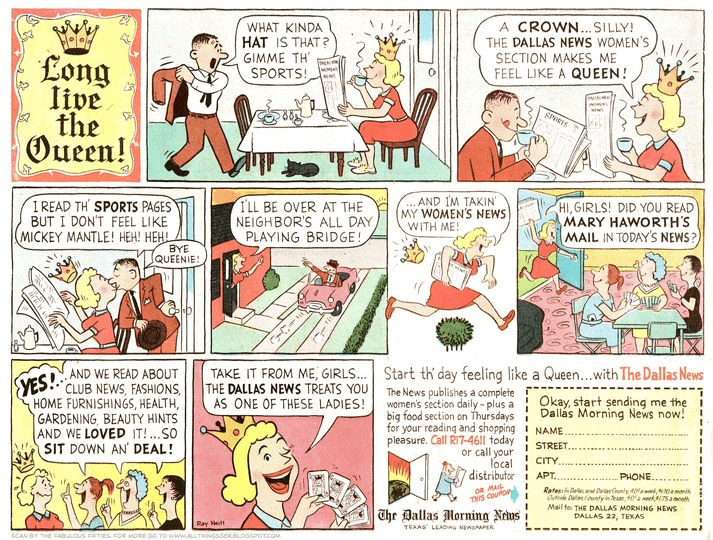CSotD: Let’s Talk About Art
Skip to comments
This Bob Eckstein cartoon came along at a propitious time, because I opened a Threads account and soon thereafter showed an interest in writers. Ever since, my feed has been filled with postings by people who ought to get off line and write something instead of talking about it.
I took writing courses in college — mostly to reduce my classload so I could write — and a writers’ conference drew me to Colorado, where I lived for nearly 20 years. I even belonged to a writers’ group briefly, until I realized I preferred sitting in my office writing to sitting in someone’s livingroom talking about writing.
I laughed at this cartoon, though, because it reminded me of our seminar in college. Senior year we declared a rule against the word “evocative.”
We didn’t drink each time someone said it, however.
Even college kids can’t drink that much.
Some Roman said “If you would be a writer, write” and it’s good advice but I can’t remember who said it, and when I tried to look it up I encountered a flood of websites about how swell it is to be a writer which circles us back to the issue of people who talk about writing.
So instead, I’ll quote Ring Lardner:
“Shut up, he explained.”

Hogan’s Alley featured this ’60s promo from the Dallas Morning News on their Facebook group. The idea of a “women’s section” has largely disappeared and good riddance, because aside from assuming that women exist to make dresses and bake cakes, it segregated topics like pregnancy, raising kids and facing breast cancer, as if they were something men didn’t need to bother their handsome little heads over.
Just as people who didn’t care about sports would toss that section aside, so, too, men didn’t read the women’s section.
And speaking of segregation, many papers in the ’40s and ’50s would have an occasional page of news about Black people, if enough businesses volunteered to advertise there. Otherwise, Black people were only found in the sports section and on the entertainment page.
A place for everyone, and everyone in their place.
Though at least people occasionally stumbled over something they hadn’t expected as they leafed through the paper looking for something else. That seems less likely to happen now that it’s all on line and you can more readily stick to things you had already decided were important.

Back to the matter of people yakking endlessly and pointlessly on line, this Speed Bump (Creators) reminds me that, if I were a master at coding, I would devise a spam filter for social media platforms to send pictures of food and videos of recipes straight to the kill file.
Some folks write about books they’ve never bothered to actually write, other people post video recipes for food they’ll never bother to actually cook.
And some post pornography. ‘Nuff said.

Another Speed Bump. Dave Coverly was having a good week.
We had a rule against Walkmen in the car on road trips. There weren’t enough times when the whole family got together to waste it driving around with backseat zombies, and, besides, it’s worthwhile to see the countryside while you’re on your way to someplace. It might even spark a conversation.
Thank god the nest was empty before they began outfitting cars with video players and then inventing phones and tablets to make those players obsolete. Though wotthehell, I could have made a rule against them, too.
“Be present” isn’t just for yogis.

Mark Anderson pulls off the nearly-impossible with this Andertoons (AMS): A Sisyphus joke that is inventive and funny.
Sisyphus was a pretty minor character in mythology, but his legend persists because it’s so applicable to people’s experiences. That also means that he fits into a lot of both gag cartoons and political cartoons, while I guess people’s feelings of isolation is why there are so many desert island cartoons.
It’s not surprising that most of them aren’t very good. Sturgeon’s Law is intended to apply to everything, and the more cartoons you have based on a topic, the more of them will be crap.
We remember certain authors but have forgotten a good many more. In Ulysses, which we remember, Molly Bloom is a great fan of Paul De Kock, whom we don’t, but he certainly outsold James Joyce in his time.
And while today people, and beagles, make mockery of “It was a dark and stormy night,” its originator, Edward Bulwer-Lytton, was not only a best-seller but persuaded Dickens to rewrite, and ruin, the ending of “Great Expectations.”
So Sturgeon was right that 90% of everything is crap, but that doesn’t mean people don’t like crap.

And speaking of crap, and of stuff I wish you could set a spam filter for on social media, Stephen Collins has a lovely vision of what might have happened if Michelangelo had been able to employ AI in painting the ceiling of the Sistine Chapel.
It made me laugh, but man oh man am I already tired of seeing AI crap on-line. Philosophically, of course, I’m opposed to it because it’s already costing artists and illustrators their jobs.
But also, as the Pope is noticing here, it’s crap, and even when they refine it so people don’t end up with seven fingers, it will still be crap because it lacks the breath of creation that is the difference between a mud figure and a living being.

Wednesday I featured Pia Guerra’s commentary on the debate, in which she created a mock-up of the famous photo of Muhammad Ali standing over the prone form of Sonny Liston, shouting at the bum to get back up and fight.

A photograph which, by the way, was taken by Neil Leifer, a human being noted for his ability to be in the right place at the right time breathing life into moments and making them magical.
Since then, I’ve seen more than one AI image of Harris in boxing gloves standing over Donald Trump, but they weren’t in the right poses to capture Ali/Liston. So, sure, they showed a knockout. But they didn’t reflect either moment, Muhammad’s or Kamala’s.
Whoever asked the computer to make those images didn’t get it, and a computer can’t be programmed to turn a schlub into an artist.


Comments 9
Comments are closed.